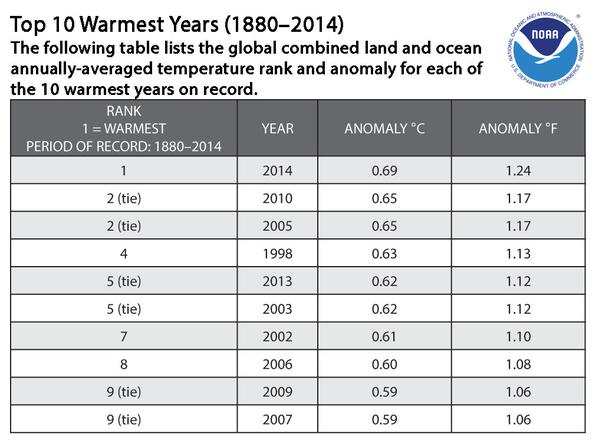NOAA, NASA say 2014 breaks the heat record as the hottest year in 135 years

Last year, 2014, happened to be the hottest year in global temperatures since scientists started keeping global heat records in 1880. This establishes the fact that the world is facing global warming issues as canvassed by climate groups and world leaders; underscoring their efforts to cut down on greenhouse gas emissions and put a cap on human activities that endanger the earth.
According to scientists, much of western United States and Alaska witnessed extreme heat much of 2014, and ocean surface warmed much more than usual the world over except near the Antarctica – and this contributed to atmospheric energy that fueled Pacific storms. The era for the warmest years started since 1997, and the 10 warmest years have occurred within this period to the present – underpinning the fact that human activities and industrial processes are contributing to planetary warming in a race to destroy nature and human civilization.
“Climate change is perhaps the major challenge of our generation,” said Michael H. Freilich, director of earth sciences at NASA, one of the agencies that track global temperatures.
Contrary to the unusual heat recorded in the West, only the eastern United States recorded below-average temperatures in 2014 out of expanse of land inhabited by man, and it is believed that this is because of indirect consequence of the release of greenhouse gases.
Most scientists seem to agree that something remarkably different about the 2015 global heat record is that the year did not witness any strong El Niño – a large-scale weather pattern in which the Pacific Ocean pumps an enormous amount of heat into the atmosphere. Although the El Niño experience of 1998 produced the hottest year of the 20th century, some scientists are of the opinion that the occurrence of any powerful El Niño quitted that year.


“Obviously, a single year, even if it is a record, cannot tell us much about climate trends,” said Stefan Rahmstorf, head of earth system analysis at the Potsdam Institute for Climate Impact Research in Germany. “However, the fact that the warmest years on record are 2014, 2010 and 2005 clearly indicates that global warming has not ‘stopped in 1998,’ as some like to falsely claim.”


Not every scientist however is bound to agree with this, and notable among these is John R. Christy, an atmospheric scientist at the University of Alabama in Huntsville. Dr. Christy is known as a skeptic about the seriousness of global warming, and he only agrees that 2014 exceeded the other record-warm years by only a few hundredths of a degree, well within the error margin of global temperature measurements. “Since the end of the 20th century, the temperature hasn’t done much,” Dr. Christy said. “It’s on this kind of warmish plateau.”


A worker from the Sao Paulo state company that provides water and sewage services to residential, commercial and industrial areas looks at the cracked ground near Jaguary dam in Braganca Paulista, Brazil on Jan. 31, 2014. Last year was the warmest on Earth since 1880, separate analysis by NASA and the National Oceanic and Atmospheric Administration released on Friday shows. (Reuters/Nacho Doce)
But then, a generality of scientists stand firm on the seriousness and threat of global warming. They look forward to the hot temperatures getting worse in the coming decades with consequential effects on forests, animals, melting ice, and other negative effects on nature.


And according to Michael E. Mann, a climate scientist at the Pennsylvania State University, “It is exceptionally unlikely that we would be witnessing a record year of warmth, during a record-warm decade, during a several decades-long period of warmth that appears to be unrivaled for more than a thousand years, were it not for the rising levels of planet-warming gases produced by the burning of fossil fuels.”
Comments